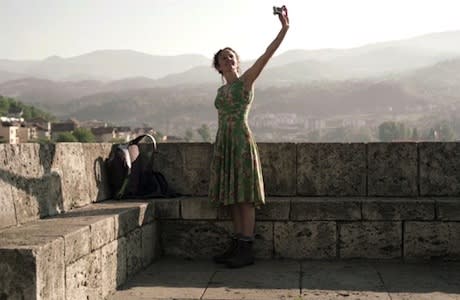As the title suggests, Jasmila Zbanic's For Those Who Can Tell No Tales is intended as a tribute, or meditation of sorts, aiming (at least in theory) to keep the memory of those lost in the Visegrad massacre alive amidst a landscape trying desperately to forget. The aim, seeing as those within Bosnia-Herzegovina are all too familiar with the rape camps and public slaughtering, is to engage the surrounding world in dialogue, ensuring that historical records aren't distorted by an insular, but understandable desire to repress and deny.
Performance artist Kym Vercoe (an Australian whose personal experiences traveling to Bosnia as a tourist inspired the film) plays a variation of herself. Framing her story with a traditional narrative that plays, in part, like a documented diary, Zbanic jumps back and forth in time to juxtapose a despondent Vercoe — burdened by knowledge — against her original idealistic self, traveling to Bosnia in a quirky, "artistic" attempt to distinguish herself from those vacationing in Fiji.
Her original experiences traipsing about the seemingly idyllic locale are recounted mostly throughout enthusiastic flashbacks, with her sharing images of Bosnian performance artists, architecture and wildlife with her privileged artist friends. Very little depth of character is given to anyone surrounding Vercoe. Rather, they all exist as mere peripheral ciphers to listen and respond to her narcissistic attachment to an issue in an effort to substantiate her liberal identity.
Eventually, Vercoe learns that the Vilina Vlas hotel, where she stayed, was used as a rape camp during the conflict, which inspires her to write passive-aggressive emails to the tourist book author that recommended it. She then returns to Bosnia when the locals don't respond to her morally vain inquiries, confronting everyone about their decision not to discuss how almost every architectural wonder and historical site had been tarnished by rape and bloodshed (something that shouldn't surprise her much, considering she comes from Sydney, where a British penal colony settled in the late 1700s).
Zbanic, in an effort to create a cohesive story out of a flimsy, self-indulgent bid for an "artist" to legitimize the self, frames these discussions with little stylization or judgment, saving images of meaning for times of introspection. As Vercoe discusses avoiding a bridge where people were raped and murdered in voiceover, Zbanic indulges in the architecture and scenery, mirroring the beauty of the landscape with Vercoe's perpetual moping.
Fortunately, efforts are made to give some context and perspective when a local essentially tells the foreigner to get over herself, pointing out that these historical locations were built hundreds of years earlier, reminding a modern society that Muslims once inhabited that land, which does briefly shift the tone from enraging self-aggrandizing.
That Vercoe's testament to the deceased is to leave flowers on a bed in a hotel is laughable, as is the transparency of her attempts to reconcile with having slept in a building where horrifying things occurred, but the basic message holds some value.
As a society, our only road to progress is to learn from past mistakes and avoid repetition. It's just a shame that Zbanic's film, much like culture overall, focuses on the sensationalized symptoms rather than the root human cause.
(Deblokada)Performance artist Kym Vercoe (an Australian whose personal experiences traveling to Bosnia as a tourist inspired the film) plays a variation of herself. Framing her story with a traditional narrative that plays, in part, like a documented diary, Zbanic jumps back and forth in time to juxtapose a despondent Vercoe — burdened by knowledge — against her original idealistic self, traveling to Bosnia in a quirky, "artistic" attempt to distinguish herself from those vacationing in Fiji.
Her original experiences traipsing about the seemingly idyllic locale are recounted mostly throughout enthusiastic flashbacks, with her sharing images of Bosnian performance artists, architecture and wildlife with her privileged artist friends. Very little depth of character is given to anyone surrounding Vercoe. Rather, they all exist as mere peripheral ciphers to listen and respond to her narcissistic attachment to an issue in an effort to substantiate her liberal identity.
Eventually, Vercoe learns that the Vilina Vlas hotel, where she stayed, was used as a rape camp during the conflict, which inspires her to write passive-aggressive emails to the tourist book author that recommended it. She then returns to Bosnia when the locals don't respond to her morally vain inquiries, confronting everyone about their decision not to discuss how almost every architectural wonder and historical site had been tarnished by rape and bloodshed (something that shouldn't surprise her much, considering she comes from Sydney, where a British penal colony settled in the late 1700s).
Zbanic, in an effort to create a cohesive story out of a flimsy, self-indulgent bid for an "artist" to legitimize the self, frames these discussions with little stylization or judgment, saving images of meaning for times of introspection. As Vercoe discusses avoiding a bridge where people were raped and murdered in voiceover, Zbanic indulges in the architecture and scenery, mirroring the beauty of the landscape with Vercoe's perpetual moping.
Fortunately, efforts are made to give some context and perspective when a local essentially tells the foreigner to get over herself, pointing out that these historical locations were built hundreds of years earlier, reminding a modern society that Muslims once inhabited that land, which does briefly shift the tone from enraging self-aggrandizing.
That Vercoe's testament to the deceased is to leave flowers on a bed in a hotel is laughable, as is the transparency of her attempts to reconcile with having slept in a building where horrifying things occurred, but the basic message holds some value.
As a society, our only road to progress is to learn from past mistakes and avoid repetition. It's just a shame that Zbanic's film, much like culture overall, focuses on the sensationalized symptoms rather than the root human cause.
